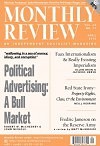Volume 61, Issue 11 (April)

April 10, 2010, marks the hundredth anniversary of the birth of Paul Sweezy (1910-2004), and December 8, 2010, will mark a century since the birth of Paul Baran (1910-1964). Their joint work, Monopoly Capital: An Essay on the American Economic and Social Order ,was published by Monthly Review Press in 1966. Between this month and December, we intend to commemorate the Baran-Sweezy Centennial through items to appear in Monthly Review, MRzine, and the MR Webpage. We will also commemorate this year the work of their close friend and colleague Harry Magdoff, born August 21, 1913, whose writing is inextricably connected to theirs. | more…
Travelers from the United States to Cuba cross more than ninety miles of sea: they cross decades of history. They may be limited to one suitcase, but they carry trunks full of ideological baggage, including biases about Cuba, beliefs about communists, commitments as to what a good society should be like, and a collection of conventional poli-sci formulas about power, government, and human behavior…Members of delegations usually have planned itineraries, visiting various institutions and cultural events. They will learn about health care, education, cultural and sport resources, commitment to an ecological pathway of development, urban agriculture, equitable distribution through the rationing system, full employment, formal aspects of the political and judicial systems, achievements in gender and racial equality. These are all real, and demonstrate how far a poor country can go with so little. But it is obviously not the full story. There is nothing sinister in this. These are the things in which Cuba has pioneered, and of which Cuba is most proud and eager to show the world…My own experience has been that the more committed revolutionaries have the most serious, complex, and thoughtful criticisms, while counterrevolutionaries mostly complain about particular hardships or unpleasant incidents. | more…
Aside from Keynes, no economist seems to have benefitted so much from the financial crisis of 2007-08 as the late Hyman Minsky. The collapse of the sub-prime market in August 2007 has been widely labeled a “Minsky moment,” and many view the subsequent implosion of the financial system and deep recession as confirming Minsky’s “financial instability hypothesis” regarding economic crisis in capitalist economies.…Recognition of Minsky’s intellectual contribution is welcome and deserved. Minsky was a deeply insightful theorist about the proclivity of capitalist economies to experience financially driven booms and busts, and the crisis has confirmed many of his insights. That said, the current article argues that his theory only provides a partial and incomplete account of the current crisis. | more…
In an article entitled “Listen, Keynesians!,” published in January 1983 in Monthly Review, Harry Magdoff and Paul Sweezy argued that the radical break that John Maynard Keynes’s General Theory of Employment, Interest and Money (1936) represented for orthodox economics lay in the fact that “For the first time the possibility was frankly faced, indeed placed at the very center of the analysis, that breakdowns of the accumulation process, the heart and soul of economic growth, might be built into the system and non-self correcting.”… In November 1982, only two months before the publication of “Listen, Keynesians!,” Magdoff and Sweezy had pointed out in “Financial Instability: Where Will it All End?” that the question as to whether a major financial crisis (on the scale of 1929) could propel the economy into a deep downturn, approaching the scale of the Great Depression of the 1930s, was still an open one. They were responding here to Hyman Minsky, a proud Keynesian (albeit with socialist leanings), “whose views,” they claimed, were “especially worthy of attention precisely because over the years he has been the American economist who has done more than any other to focus on the crucially important destabilizing role of the financial system in advanced capitalist countries.” | more…
The recession that began in the second quarter of 1981 (the second in two years) dragged on into 1982. Most observers look for some recovery in the second half of the year, but hardly anyone expects it to be vigorous. Meanwhile, all the typical signs of stagnation continue to be in evidence. The official unemployment rate which stood at 7.6 percent in 1981 rose to 9.5 percent by the middle of 1982, and the manufacturing capacity utilization rate fell from 79.9 percent to 69.9 percent in the same period.… The counterpart to this stagnation in the realm of production and employment was a continuing ballooning of the financial superstructure of the economy which, as the essays in this volume have been at pains to emphasize, has been one of the most spectacular features of capitalist development during the post-Second World War period. | more…
Adrienne Rich is the author of more than sixteen volumes of poetry and five nonfiction prose books, the most recent being A Human Eye: Essays on Art in Society (Norton). She is the recipient of numerous awards and prizes, including a MacArthur Fellowship and the 1999 Lannan Foundation Lifetime Achievement Award. | more…
